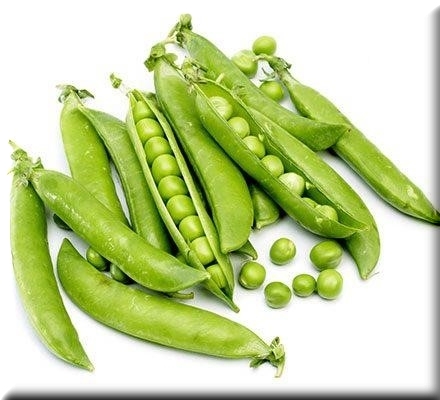Garden
Are Garden Peas Healthy? The Nutritional Powerhouse of Garden Peas
You might already know that garden peas are delicious, but did you know they’re also a nutritional powerhouse? As a legume, garden peas are packed with protein, fiber, vitamins, and minerals that can benefit your overall health. If you’re looking to add more nutritious foods to your diet, then these little green gems deserve a spot on your plate.
The Nutritional Powerhouse of Garden Peas
Let’s dive into the impressive nutritional profile of garden peas. They’re a great source of plant-based protein, which is especially important for vegetarians and vegans. But they also contain a good amount of fiber, which is crucial for digestive health and blood sugar control.
A Legume Packed with Protein and Fiber
Protein is essential for building and repairing tissues, making enzymes and hormones, and maintaining a healthy immune system. Garden peas provide a decent amount of protein per serving, making them a satisfying and filling addition to your meals. Fiber is another key nutrient found in abundance in garden peas. It aids in digestion, helps regulate blood sugar levels, and can even contribute to weight management.
A Spectrum of Vitamins and Minerals
Garden peas are not just about protein and fiber; they’re also a good source of vitamins and minerals. You’ll find vitamins A, C, K, and a range of B vitamins in these little green gems. Vitamin A is important for eyesight and skin health, while Vitamin C is a powerful antioxidant that boosts your immune system. Vitamin K is essential for blood clotting, and B vitamins are vital for energy production and nerve function.
In addition to vitamins, garden peas are rich in minerals like iron, magnesium, potassium, and calcium. Iron is essential for carrying oxygen throughout the body, while magnesium helps regulate blood pressure and supports muscle function. Potassium is crucial for maintaining fluid balance, and calcium is essential for strong bones and teeth.
Antioxidant Powerhouse
Did you know that garden peas are also an excellent source of antioxidants? Antioxidants help protect your cells from damage caused by free radicals, which are unstable molecules that can contribute to aging and disease. Garden peas contain carotenoids and flavonoids, which are powerful antioxidants that can help protect against heart disease, cancer, and other chronic illnesses.
Health Benefits of Garden Peas
The impressive nutritional profile of garden peas translates into a range of potential health benefits. Here are some of the key ways garden peas can positively impact your health.
Heart Health Support
The fiber, potassium, magnesium, and antioxidants in garden peas are all known to support heart health. Fiber can help lower cholesterol levels, which is a major risk factor for heart disease. Potassium helps regulate blood pressure, and magnesium can help relax blood vessels, improving blood flow.
Blood Sugar Management
Garden peas have a low glycemic index (GI), which means they don’t cause rapid spikes in blood sugar levels after you eat them. This makes them an excellent choice for people with diabetes or those looking to manage blood sugar levels. The fiber in peas can slow down the absorption of sugar, further helping to control blood sugar fluctuations.
Digestive Health Support
The fiber in garden peas is a digestive powerhouse. It adds bulk to stool, making it easier to pass and preventing constipation. Fiber also promotes the growth of beneficial bacteria in your gut, which is crucial for maintaining a healthy digestive system.
Potential Cancer Protection
Some studies suggest that the antioxidants and other compounds in garden peas may offer some protection against certain cancers. Further research is needed to fully understand the link between garden peas and cancer, but the antioxidant content and other beneficial compounds in peas make them a valuable addition to a cancer-prevention diet.
Fresh vs. Frozen Peas: Which is Better?
You might wonder if fresh peas are better than frozen peas. In reality, both offer similar nutritional value. However, frozen peas have the advantage of being readily available year-round and often more affordable. Fresh peas, on the other hand, might have a slightly higher vitamin content when in season. Ultimately, choose the option that works best for you and your budget.
Are There Any Concerns?
While garden peas offer many health benefits, there are some potential concerns to be aware of.
Pea Allergies
Like other legumes, peas can be a common allergen. If you have a pea allergy, you’ll need to avoid them completely. Symptoms of a pea allergy can range from mild skin reactions to severe anaphylaxis, so it’s crucial to seek medical attention if you suspect you have a pea allergy.
FODMAPs and Digestive Discomfort
Garden peas contain FODMAPs, which are fermentable carbohydrates that can cause digestive discomfort in some people. If you’re sensitive to FODMAPs, you might experience bloating, gas, and stomach pain after eating peas. If you have digestive issues, it’s a good idea to consume peas in moderation or choose low-FODMAP alternatives.
Incorporating Peas into Your Diet
Garden peas are incredibly versatile, making them easy to incorporate into your diet.
Delicious and Versatile Recipes
Try adding them to soups, salads, pasta dishes, stir-fries, and even smoothies. You can roast them with spices for a healthy snack, or puree them into a delicious dip.
FAQ
Are peas good for weight loss?
While garden peas are nutritious and relatively low in calories, they are not a magic weight loss solution. A balanced diet and regular exercise are essential for achieving sustainable weight loss.
How many peas should I eat per day?
There is no specific recommended daily intake for garden peas. However, incorporating them into your diet a few times a week as part of a balanced meal plan can provide a range of health benefits.
Can I eat peas if I have diabetes?
Garden peas are a suitable food for people with diabetes due to their low glycemic index and high fiber content. They help manage blood sugar levels and can be a valuable addition to a diabetes-friendly diet.
Can I eat peas if I have digestive issues?
If you have digestive issues, you might want to limit your intake of peas or choose low-FODMAP varieties. It’s also a good idea to listen to your body and see how you feel after eating peas.
Are peas good for children?
Yes, garden peas are a nutritious and delicious food for children. They are a good source of protein, fiber, and essential vitamins and minerals.
Conclusion
Garden peas are a versatile and nutritious addition to any diet. They are a good source of protein, fiber, vitamins, minerals, and antioxidants, making them a valuable food for promoting overall health. So, next time you’re planning a meal, consider adding these little green gems to your plate.
Goodxtop loves hearing from our readers! Leave a comment below, share this article with your friends, and continue exploring our website for more insightful gardening tips and information.


